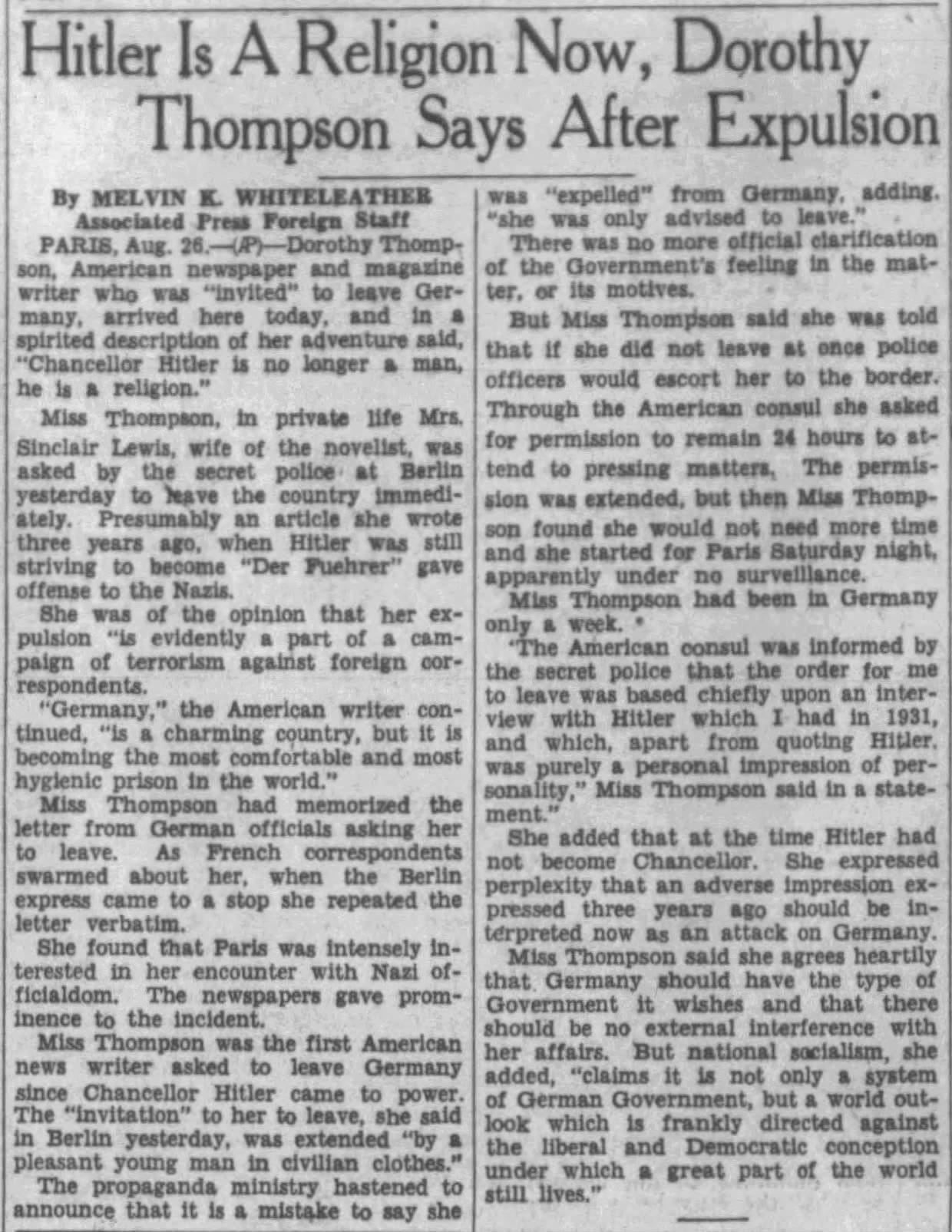- Headline
-
Hitler Is A Religion Now, Dorothy Thompson Says After Expulsion
- Publication Date
- Monday, August 27, 1934
- Historical Event
-
Dorothy Thompson Expelled from Germany
This database includes 724 articles about this event - Article Type
- Newspaper
- Location
- Page Section and Number
- 5
- Author/Byline
- Melvin D. Whiteleather (AP Foreign Staff)
- Article Text
- PARIS, Aug. 26.—(AP)—Dorothy Thompson, American newspaper and magazine writer who was "invited" to leave Germany, arrived here today, and in a spirited description of her adventure said, "Chancellor Hitler is no longer a man, he is a religion."
Miss Thompson, in private life Mrs. Sinclair Lewis, wife of the novelist, was asked by the secret police at Berlin yesterday to leave the country immediately. Presumably an article she wrote three years ago, when Hitler was still striving to become "Der Fuehrer" gave offense to the Nazis.
She was of the opinion that her expulsion "is evidently a part of campaign of terrorism against foreign correspondents.
"Germany," the American writer continued, "is a charming country, but it is becoming the most comfortable and most hygienic prison in the world."
Miss Thompson had memorized the letter from German officials asking her to leave. As French correspondents swarmed about her, when the Berlin express came to a stop she repeated the letter verbatim.
She found that Paris was intensely interested in her encounter with Nazi officialdom. The newspapers gave prominence to the incident.
Miss Thompson was the first American news writer asked to leave Germany since Chancellor Hitler came to power. The "invitation" to her to leave, she said in Berlin yesterday, was extended "by a pleasant young man in civilian clothes."
The propaganda ministry hastened to announce that it is a mistake to say she was "expelled" from Germany, adding. "she was only advised to leave."
There was no more official clarification of the Government's feeling in the matter, or its motives.
But Miss Thompson said she was told that if she did not leave at once police officers would escort her to the border. Through the American consul she asked for permission to remain 24 hours to attend to pressing matters. The permission was extended, but then Miss Thompson found she would not need more time and she started for Paris Saturday night, apparently under no surveillance.
Miss Thompson had been in Germany only a week. *
"The American consul was informed by the secret police that the order for me to leave was based chiefly upon an interview with Hitler which I had in 1931, and which, apart from quoting Hitler, was purely a personal impression of personality," Miss Thompson said in a statement."
She added that at the time Hitler had not become Chancellor. She expressed perplexity that an adverse impression expressed three years ago should be interpreted now as an attack on Germany.
Miss Thompson said she agrees heartily that. Germany should have the type of Government it wishes and that there should be no external interference with her affairs. But national socialism, she added, "claims it is not only a system of German Government, but a world outlook which is frankly directed against the liberal and Democratic conception under which a great part of the world still lives." - History Unfolded Contributor
- Randall S.
- Location of Research
- Newspapers.com (https://www.newspapers.com)
Learn More about this Historical Event: Dorothy Thompson Expelled from Germany
- Dorothy Thompson Papers (Syracuse University Libraries)
Bibliography
Lipstadt, Deborah E. Beyond Belief: The American Press and the Coming of the Holocaust, 1933-1945. New York: Free Press, 1986.
Nagorski, Andrew. Hitlerland: American Eyewitnesses to the Nazi Rise to Power. New York: Simon & Schuster, 2012.
All articles about this event

Download the full newspaper page
See full image on newspapers.com
Newspaper images provided by Newspapers.com
